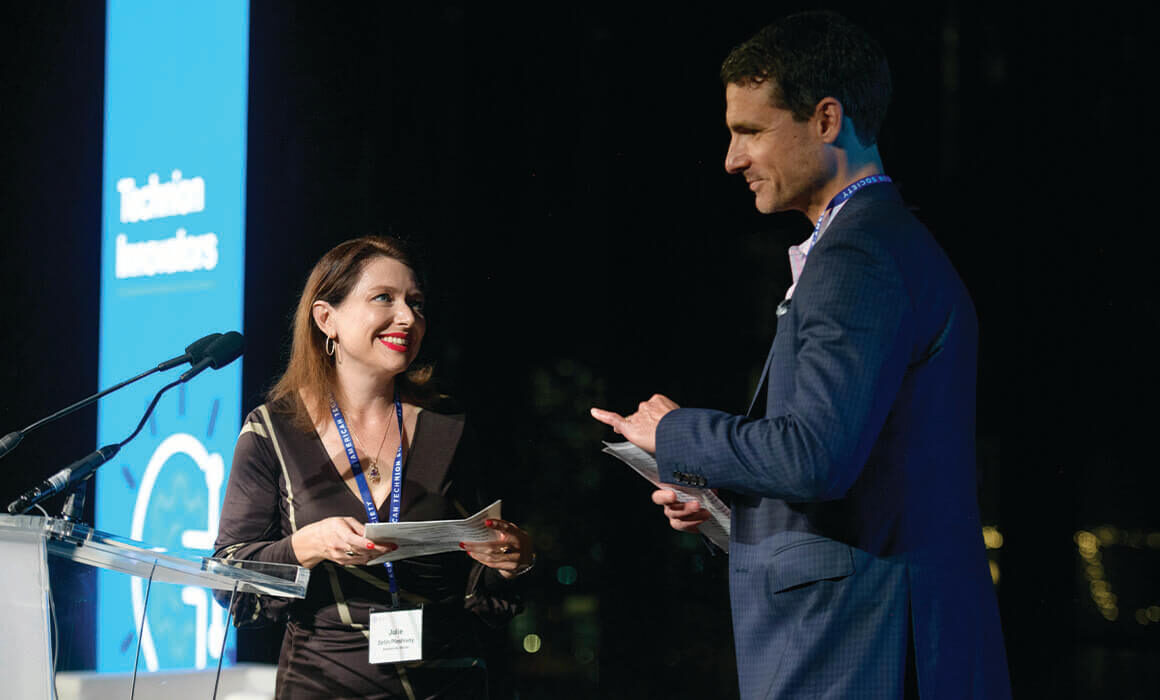Chicago Technion Innovators is a vibrant two-year program designed to educate future American Technion Society (ATS) leaders about the impact of the Technion. Each cohort consists of emerging leaders within the Chicago community interested in supporting Israel and its technological innovation, and in ensuring the future of the ATS. Innovators attend in-person and virtual events with faculty, students, and alumni to learn about the Technion’s cutting-edge research and its important place in Israel’s history. Graduates are invited to serve on Chicago’s local leadership board, and over time may assume national leadership positions. The following interview was conducted with program co-founders Seth Jackier and Julie Sirlin Pleshivoy.
◼ Why is Chicago Innovators important for ATS and the Technion?
Seth: Every charitable organization needs young talent. Technion Innovators is the pipeline that finds, vets, and develops that talent, making it crucial for the success of ATS. Our hope is that it will serve as a model for our partners in other cities around the globe.
◼ What was the genesis of the program?
Julie: For many years, I attended ATS events and noticed a significant age difference between me and most of the attendees. It became important to me to attract younger people to the ATS National Board and to build the next generation of leaders. Being a mom of two young children and a full-time partner in a law firm, I was keenly aware of my limited time, but my passion for the Technion and its impact on Israel and the world meant that I needed to contribute in any way I could. Sharing with others my vision for ATS and my personal obstacles, the “recipe” for attracting young professionals became clear. ATS needed to give younger Jewish professionals an opportunity to add value on their terms by providing a shorter commitment to the Board while aiming to build a relationship with ATS, the Technion, and Israel. Once we formulated this as the ultimate goal, Seth and I worked on creating the Technion Innovators Program.
◼ Seth, your father and grandfather were the only father-son team to receive Honorary Fellowships, and your father led the organization and the Technion Board of Governors. Can you talk about your personal path toward becoming active in ATS?
S: My family history with the University weighs heavily in my connection to ATS and my decision to get personally involved. Additionally, the Technion has also drawn me in due to a correlation between my personal values and those of the University, things like: environmental stewardship, capital efficiency, and approaching seemingly insurmountable problems with novel cross-specialty collaboration. Moreover, the University plays an enormous role in serving, protecting, and educating Israelis of all backgrounds and religions as well as saving and improving the lives of people everywhere.
◼ Julie, what brought you to support ATS and the Technion?
J: I was introduced to the Technion when I was in college. My childhood best friend from the former Soviet Union was a Technion graduate, and I was very impressed with her education. After graduating from college, I attended many ATS events with my work colleagues and continued my involvement throughout law school and thereafter during my professional career as an estate planning attorney. I had the privilege of working with clients who supported Soviet émigrés with scholarships to pursue their education and research at the Technion. I was moved by many of the immigrants, who, as Technion graduates, devoted their careers to science and technology. My connection to the Technion and its impact on Israel and the world inspired me to actively participate in ATS.
◼ What’s in the water in Chicago? Why do many ATS national presidents and leaders hail from Chicago?
S: Chicago possesses a strong and active Jewish community. Philanthropy and generosity are embedded in the culture here, and we happened to have had guys like Leonard Sherman and Ben Sosewitz. The two, who have sadly passed away, were once-in-a-lifetime talents that Chicago was just lucky to have. Leonard, for all his professional success, would say that he was in the “business of the Jewish people.” That kind of dedication is special and unusual and sets the tone for the ATS in Chicago. Moreover, the new Joel and Jeri Rothman Leadership Program builds on the tradition of the 21st Century Leadership Development Program, co-founded by Ben 25 years ago.
◼ Julie, can you speak to potential supporters who may also be young mothers like yourself about the personal challenges and rewards that come with ATS involvement?
J: Time is the most precious thing we have, and I wish I had more time to give to ATS and its programs. My involvement with ATS and the Technion is rewarding and meaningful to me, because education is one of my core values, and I believe that education is the key to bettering Israel and the world.
◼ Seth, how do you define the program’s success? What would you like to see in 10 years’ time?
S: We would like the program to be self-sustaining. And currently, we couldn’t be happier with how our second cohort is going. Current co-chairs Avi Davidoff and Rob Bressler serve on the ATS Board and are two of the stars from our inaugural cohort. We have other leaders from the original cohort, like Sam Schwartz, who have also joined the Chicago ATS Board. And beautifully, we have in our second cohort Dylan Levin, who is the son of Jonathon Levin, one of our fantastic members from the first cohort.
